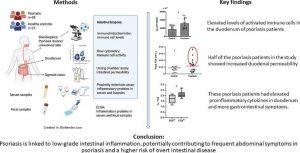Psoriasis is a hereditary, chronic inflammatory condition. While primarily recognized as a skin disease, it often co-occurs with joint inflammation and a heightened risk of chronic inflammatory bowel diseases (IBD) like Crohn’s disease. Previous research had shown that individuals with psoriasis frequently report gastrointestinal symptoms, but the underlying causes were not well understood.
New research has uncovered a significant connection between psoriasis and intestinal inflammation, shedding light on why individuals with this chronic skin condition often experience gastrointestinal issues and are at a higher risk for Crohn’s disease (Figure 1). The study provides evidence of invisible inflammation and increased intestinal permeability, or “leaky gut,” in psoriasis patients.
Key findings include:
- Elevated Immune Activity: Psoriasis patients had higher numbers of pro-inflammatory immune cells in the mucous lining of their small intestines. These immune cells were similar to those found in psoriatic skin lesions, suggesting a potential link between skin and gut inflammation.
- Leaky Gut: Half of the psoriasis patients showed increased intestinal barrier permeability, allowing bacteria and harmful substances to pass into the bloodstream. This condition, known as leaky gut, can trigger widespread inflammation.
- Gastrointestinal Symptoms: Patients with leaky gut reported more frequent gastrointestinal symptoms, such as abdominal pain and bloating. These patients also exhibited elevated levels of inflammatory substances in their intestines.
The study’s findings are particularly noteworthy given that the psoriasis patients had relatively mild skin symptoms and no visible signs of intestinal inflammation during gastroscopy. Despite this, significant differences in intestinal health were observed compared to healthy controls.
These findings highlight the importance of recognizing the gut-skin connection in psoriasis management. The invisible inflammation and intestinal changes identified in this study may explain why psoriasis patients often experience gastrointestinal problems and are more susceptible to Crohn’s disease.
Journal article: Lundquist, P., et al., 2025. Mild-to-moderate psoriasis is associated with subclinical inflammation in the duodenum and a tendency of disturbed intestinal barrier. Biochimica et Biophysica Acta (BBA) – Molecular Basis of Disease.
Summary by Stefan Botha











